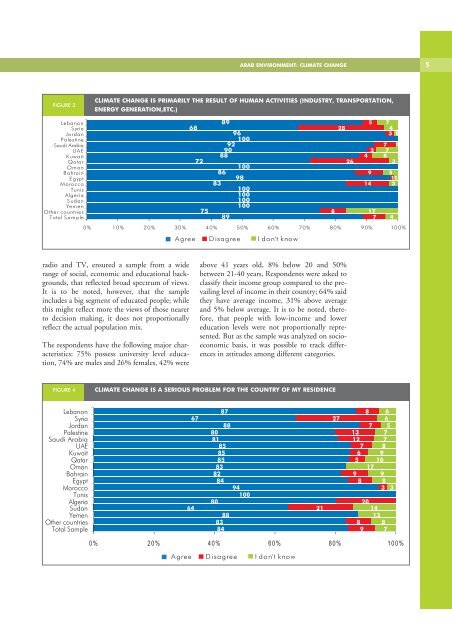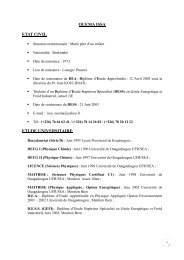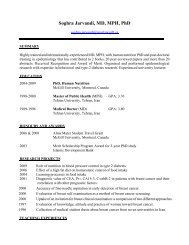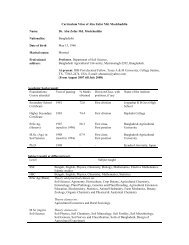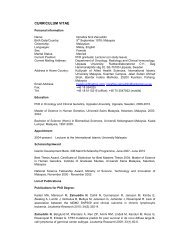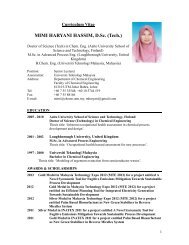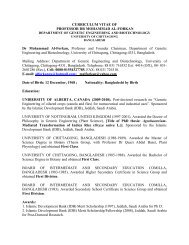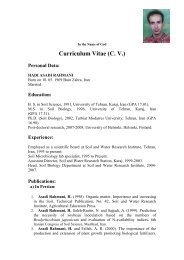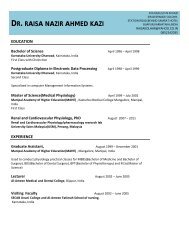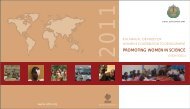Impact of Climate Change on Arab Countries - IPCC
Impact of Climate Change on Arab Countries - IPCC
Impact of Climate Change on Arab Countries - IPCC
You also want an ePaper? Increase the reach of your titles
YUMPU automatically turns print PDFs into web optimized ePapers that Google loves.
ARAB ENVIRONMENT: CLIMATE CHANGE 5<br />
FIGURE 3<br />
CLIMATE CHANGE IS PRIMARILY THE RESULT OF HUMAN ACTIVITIES (INDUSTRY, TRANSPORTATION,<br />
ENERGY GENERATION,ETC.)<br />
Leban<strong>on</strong><br />
Syria<br />
Jordan<br />
Palestine<br />
Saudi <strong>Arab</strong>ia<br />
UAE<br />
Kuwait<br />
Qatar<br />
Oman<br />
Bahrain<br />
Egypt<br />
Morocco<br />
Tunis<br />
Algeria<br />
Sudan<br />
Yemen<br />
Other countries<br />
Total Sample<br />
68<br />
72<br />
75<br />
83<br />
89<br />
92<br />
90<br />
88<br />
86<br />
89<br />
96<br />
100<br />
100<br />
98<br />
100<br />
100<br />
100<br />
100<br />
8<br />
28<br />
26<br />
5<br />
3<br />
4<br />
9<br />
14<br />
17<br />
7<br />
7<br />
4<br />
3 1<br />
7 1<br />
7<br />
8<br />
3<br />
0% 10% 20% 30% 40% 50% 60% 70% 80% 90% 100%<br />
Agree Disagree I d<strong>on</strong>'t know<br />
5<br />
11<br />
3<br />
4<br />
radio and TV, ensured a sample from a wide<br />
range <str<strong>on</strong>g>of</str<strong>on</strong>g> social, ec<strong>on</strong>omic and educati<strong>on</strong>al backgrounds,<br />
that reflected broad spectrum <str<strong>on</strong>g>of</str<strong>on</strong>g> views.<br />
It is to be noted, however, that the sample<br />
includes a big segment <str<strong>on</strong>g>of</str<strong>on</strong>g> educated people; while<br />
this might reflect more the views <str<strong>on</strong>g>of</str<strong>on</strong>g> those nearer<br />
to decisi<strong>on</strong> making, it does not proporti<strong>on</strong>ally<br />
reflect the actual populati<strong>on</strong> mix.<br />
The resp<strong>on</strong>dents have the following major characteristics:<br />
75% possess university level educati<strong>on</strong>,<br />
74% are males and 26% females, 42% were<br />
above 41 years old, 8% below 20 and 50%<br />
between 21-40 years, Resp<strong>on</strong>dents were asked to<br />
classify their income group compared to the prevailing<br />
level <str<strong>on</strong>g>of</str<strong>on</strong>g> income in their country; 64% said<br />
they have average income, 31% above average<br />
and 5% below average. It is to be noted, therefore,<br />
that people with low-income and lower<br />
educati<strong>on</strong> levels were not proporti<strong>on</strong>ally represented.<br />
But as the sample was analyzed <strong>on</strong> socioec<strong>on</strong>omic<br />
basis, it was possible to track differences<br />
in attitudes am<strong>on</strong>g different categories.<br />
FIGURE 4<br />
CLIMATE CHANGE IS A SERIOUS PROBLEM FOR THE COUNTRY OF MY RESIDENCE<br />
Leban<strong>on</strong><br />
Syria<br />
Jordan<br />
Palestine<br />
Saudi <strong>Arab</strong>ia<br />
UAE<br />
Kuwait<br />
Qatar<br />
Oman<br />
Bahrain<br />
Egypt<br />
Morocco<br />
Tunis<br />
Algeria<br />
Sudan<br />
Yemen<br />
Other countries<br />
Total Sample<br />
64<br />
67<br />
87<br />
88<br />
80<br />
81<br />
85<br />
85<br />
85<br />
83<br />
82<br />
84<br />
80<br />
88<br />
83<br />
84<br />
94<br />
100<br />
21<br />
27<br />
13<br />
12<br />
7<br />
6<br />
5<br />
9<br />
8<br />
8<br />
9<br />
8<br />
20<br />
7<br />
17<br />
6<br />
6<br />
5<br />
7<br />
7<br />
8<br />
9<br />
10<br />
9<br />
8<br />
3 3<br />
14<br />
13<br />
8<br />
7<br />
0% 20% 40% 60% 80% 100%<br />
Agree Disagree I d<strong>on</strong>'t know


